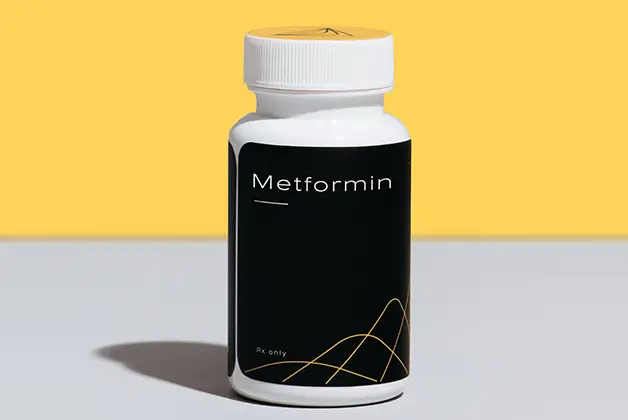Metformin Could Benefit Your Health, Even If You Don’t Have Diabetes
Fast Facts
- Metformin is a medication regularly prescribed to treat high blood sugar levels.
- Metformin can be prescribed off-label to treat prediabetes, cancer, cardiovascular and neurodegenerative disease.
- Emerging studies suggest that metformin may also help prevent or delay age-related diseases in healthy individuals, but more research is needed.
If you have diabetes or pre-diabetes, you’ve likely heard of metformin, an anti-diabetic drug that decreases the amount of glucose your body absorbs and produces. The health benefits of metformin for treating type 2 diabetes are well-known: the drug is it’s effective, safe, and proven.
Over time, scientists have discovered even more potential metformin benefits, ones that may go far beyond treating type 2 diabetes. As a result, some have even dubbed it a “wonder drug” (1).
Off-label, metformin is already used to treat obesity, polycystic ovary syndrome (PCOS) in women, and cancer. One recent study with hypogonadal men even found that one of the benefits of metformin was helping to ease the negative effects (2) of stopping testosterone replacement therapy (TRT).
In healthy people, the diabetes drug is sometimes prescribed off-label for weight loss, heart health, and more. Metformin is the subject of clinical trials on anti-aging (3); it’s top of mind for cancer researchers (4).
Metformin’s powerful mechanisms are still being studied, but likely include the drug’s ability to lower levels of glucose in the body, enhance insulin sensitivity, and attenuate the hallmarks of aging (5). Here’s what we know so far, what researchers are looking at with the drug, and what you need to know about whether or not the benefits of metformin could extend to you.
What Is Metformin?
Metformin is a medication that treats type 2 diabetes, a condition in which your body doesn’t use insulin—a hormone that your pancreas creates to control blood glucose levels (blood sugar)—properly. Metformin belongs to a class of medications called biguanides.
Metformin works in a few ways to help people with diabetes. It controls the amount of sugar that the body produces and absorbs from food. It also decreases the amount of glucose made by the liver.
Metformin also increases insulin sensitivity (6), or how well your cells respond to insulin. If you have higher insulin sensitivity, it means that your body can more effectively use blood sugar.
Metformin at a Glance
- Metformin is a diabetes treatment that decreases the amount of glucose your body absorbs and produces
- Metformin is already used to treat obesity, polycystic ovary syndrome (PCOS) in women, and cancer
- Metformin is the subject of clinical trials on anti-aging
Metformin might have powerful impacts on people who do not have type 2 diabetes.
Metformin Benefits
There are many potential advantages to taking metformin, including treating type 2 diabetes.
Whether you’re taking it for type 2 diabetes, general weight loss, or as a part of cancer treatment, many of the benefits come down to reduced blood sugar, which can have different benefits in the body, including:
- Weight loss
- Lower blood pressure
- Lower cholesterol
- A lower risk for heart disease and cardiovascular-related deaths
What Is Metformin Used for Other than Diabetes?
What happens if you take metformin and you don’t “need” it? Because it helps stabilize blood sugar levels, metformin has clear and proven benefits for those with type 2 diabetes. High blood sugar can play a role in serious health issues such as heart disease, heart failure, stroke, and kidney problems.
But emerging research on metformin suggests the medication might also have powerful impacts on people who do not have type 2 diabetes.
The National Institutes of Health’s National Library of Medicine notes that metformin can be prescribed off-label for other reasons beyond type 2 diabetes. Some of the most impressive benefits of metformin include preventing or treating other health conditions.
Prediabetes
If you have prediabetes, your blood sugar levels are elevated but aren’t high enough to qualify as diabetes. They could still cause damage over time, however. Metformin may delay the onset of diabetes or prevent it from developing in those who have prediabetes.
Cancer
Eric Acebedo, M.D., an internal medicine specialist in Las Vegas, NV, has prescribed metformin off-label for cancer treatment in combination with conventional therapies and herbal supplements. “Cancer cells love glucose,” he says. “Metformin inhibits gluconeogenesis—the metabolic pathway that creates glucose. The result is decreased glucose production.” Without enough glucose, cancer cells can’t grow and reproduce.
Numerous studies have shown that use of metformin is associated with improved prognosis for cancer patients, and may even help prevent cancer, including liver, pancreatic, and colon cancer (7).
Cardiovascular disease
While the benefits of metformin for cardiovascular health are likely stronger in those with type 2 diabetes—research finds its use is linked with lower rates of death from all causes (8)—some evidence (9) also suggests that the drug is a potential treatment for heart disease in those without diabetes.
Neurodegenerative disease
Metformin stimulates the microbiome and decreases gut inflammation leading to “leaky gut”, says Acebedo. “When you have more good bacteria, they synthesize short-chain fatty acids called butyrate and acetate. Even when you’re not a diabetic, this inhibits glucose production in the liver.”
In short: The body’s microbiome plays a role in limiting the production of glucose in the body. The result: potentially lower blood sugar levels.
It also helps in decreasing the low-grade inflammation that comes from the gut in older people (5). Decreasing gut inflammation also decreases brain inflammation through the gut-brain axis.
Obesity
Some people with mental health disorders such as schizophrenia take antipsychotic medications, which can cause significant weight gain. Research shows that metformin can lessen weight gain among some people taking these drugs (10).
Metformin Benefits Beyond Diabetes
Metformin can be prescribed off-label to help treat chronic health conditions including prediabetes, cancer, cardiovascular disease, neurodegenerative disease and obesity.
Metformin, now available from Hone, may help you ward off age-related illnesses. Connect with a doctor and get treatment delivered—without leaving home.
How To Get a Metformin Prescription
If you think you might benefit from a metformin prescription, touch base with your doctor. If you’re not diabetic or prediabetic, ask about the potential benefits of metformin for things like longevity and weight loss. A provider who knows you and your health history will be able to discuss options.
What Are The Side Effects of Metformin?
Metformin can result in side effects, particularly GI symptoms, says Acebedo.
Since metformin causes changes in blood sugar, The National Institutes of Health’s National Library of Medicine notes (11) that it’s important to know the symptoms of both high and low blood sugar.
Some signs of low blood sugar:
- Shakiness
- Nervousness or anxiety
- Sweating, chills, clamminess
- Irritability, impatience, confusion
- Fast heartbeat
- Feeling lightheaded
If you notice signs of low blood sugar, the American Diabetes Association recommends “The 15-15 rule,” which is eating 15 grams of carbs to raise your blood sugar and checking your blood sugar after 15 minutes. If numbers are still below 70 milligrams (mg) per deciliter (dL), the group recommends having another serving. If you are ever worried about symptoms, call 911.
Some signs of high blood sugar:
- Frequent need to urinate
- Increased thirst
- Blurred vision
- Fatigue
- Headache
If you notice signs of high blood sugar and are sick and can’t keep food or fluid down or have blood sugar levels that are regularly above 240 mg/dL, call 911. Otherwise, make an appointment with your doctor as, over time, high blood sugar has negative consequences.
Side Effects of Metformin
You could notice some of the below symptoms while taking metformin:
- Diarrhea
- Bloating
- Gas
- Constipation
- Stomach pain
- A metallic taste in your mouth
- Heartburn
- Headache
- Skin or nail changes
- Muscle pain
What Happens When Someone Who Doesn’t Have Diabetes Takes Metformin?
Because metformin is approved for the treatment of type 2 diabetes, and other uses are off-label, all of the other potential benefits have not been studied as extensively.
Someone who is nondiabetic might notice decreases in inflammation, anti-aging benefits, and some weight loss, says Acebedo. A review of research (12) published last year in Frontiers in Endocrinology concluded that “metformin can improve healthspan … extending the period of life spent in good health.”
Research on metformin use in healthy people also suggests that taking the drug might impact your ability to see gains from your workouts. One recent study found that elderly participants who took metformin didn’t gain as much benefit from aerobic exercise as those taking a placebo pill over the course of a 12 week trial (13). Another study on elderly adults participating in resistance training showed a blunting effect on adding lean body and muscle mass when taking metformin (14).
In both trials, the sample sizes were small and the effects were variable between participants, highlighting the need for more studies. Benjamin Miller, Ph.D., a principal investigator in the aging and metabolism research program at the Oklahoma Medical Research Foundation, who oversaw the first study told the New York Times that the results of that research don’t mean that people should avoid the drug, even if they’re taking it for the potential anti-aging benefits. But the findings “do give us reason to think a bit more cautiously” about the impact of metformin on exercise in healthy people, Miller told the Times.
As always, it’s important to touch base with a provider who knows you and your medical details about any kind of prescription to better understand what the best course of action is for you.
The Bottom Line
Metformin is regularly prescribed to treat high blood sugar levels, but its benefits extend beyond diabetes. In addition to treating prediabetes, cancer, cardiovascular and neurodegenerative disease, emerging studies suggest that metformin may also help prevent or delay age-related diseases in healthy individuals. If you’re interested in taking metformin for these potential benefits, speak to your doctor or contact Hone.
References
1. Is Metformin a Wonder Drug? (2021). https://www.health.harvard.edu/blog/is-metformin-a-wonder-drug-202109222605
2. Krysiak R, et al (2021). Hypothalamic-pituitary-gonadal axis and sexual functioning in metformin-treated men after discontinuation of testosterone replacement therapy: A pilot study. https://pubmed.ncbi.nlm.nih.gov/34490645/
3. Tame Trial. https://www.afar.org/tame-trial
4. Clinical Trials Using Metformin Hydrochloride (n.d.) https://www.cancer.gov/about-cancer/treatment/clinical-trials/intervention/metformin-hydrochloride
5. Kulkarni AS, et al (2020). Benefits of Metformin in Attenuating the Hallmarks of Aging. https://pubmed.ncbi.nlm.nih.gov/32333835/
6. Metformin Revisited (2017). https://www.mayoclinic.org/medical-professionals/endocrinology/news/metformin-revisited/mac-20430448
7. Yu Hong, et al (2019). The Potential Effect of Metformin on Cancer: An Umbrella Review. https://www.frontiersin.org/articles/10.3389/fendo.2019.00617/full
8. Bergmark BA, et al (2019). Metformin Use and Clinical Outcomes Among Patients With Diabetes With or Without Heart Failure or Kidney Dysfunction: Observations From the SAVOR-TIMI 53 Trial. https://www.ahajournals.org/doi/10.1161/CIRCULATIONAHA.119.040144
9. Rena G, Lang CC (2018). Repurposing Metformin for Cardiovascular Disease. Circulation. https://pubmed.ncbi.nlm.nih.gov/29378754/
10. Hendrick V, et al (2017). Minimizing weight gain for patients taking antipsychotic medications: The potential role for early use of metformin. https://pubmed.ncbi.nlm.nih.gov/28463344/
11. Metformin [Fact Sheet] (2020). https://medlineplus.gov/druginfo/meds/a696005.html#side-effects
12. Mohammed Ibrahim, et al (2021). A Critical Review of the Evidence That Metformin Is a Putative Anti-Aging Drug That Enhances Healthspan and Extends Lifespan. https://www.frontiersin.org/articles/10.3389/fendo.2021.718942/full
13. Konopka AR, et al (2019). Metformin inhibits mitochondrial adaptations to aerobic exercise training in older adults .https://pubmed.ncbi.nlm.nih.gov/30548390/
14. Walton RG, et al (2019). Metformin blunts muscle hypertrophy in response to progressive resistance exercise training in older adults: A randomized, double-blind, placebo-controlled, multicenter trial: The MASTERS trial. https://pubmed.ncbi.nlm.nih.gov/30548390/















